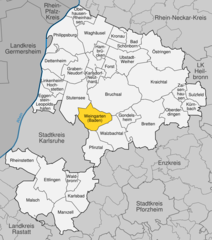
Back Weingarten (Baden) ALS Weingarten (Baden) Catalan Вайнгартен (Баден) CE Weingarten (munisipyo sa Alemanya, Baden-Württemberg Region, Karlsruhe Region, lat 49,04, long 8,52) CEB Weingarten (Baden) German Weingarten (Badeno) EO Weingarten (Baden) Spanish Weingarten (Baden) EU واینگارتن (بادن) FA Weingarten (Baden) French
You can help expand this article with text translated from the corresponding article in German. (February 2009) Click [show] for important translation instructions.
|
Weingarten | |
|---|---|
 | |
Location of Weingarten (Baden) within Karlsruhe district  | |
| Coordinates: 49°3′5″N 8°31′50″E / 49.05139°N 8.53056°E | |
| Country | Germany |
| State | Baden-Württemberg |
| Admin. region | Karlsruhe |
| District | Karlsruhe |
| Government | |
| • Mayor (2018–26) | Eric Bänziger[1] |
| Area | |
• Total | 29.40 km2 (11.35 sq mi) |
| Elevation | 144 m (472 ft) |
| Population (2022-12-31)[2] | |
• Total | 10,534 |
| • Density | 360/km2 (930/sq mi) |
| Time zone | UTC+01:00 (CET) |
| • Summer (DST) | UTC+02:00 (CEST) |
| Postal codes | 76356 |
| Dialling codes | 07244 |
| Vehicle registration | KA |
| Website | www.weingarten-baden.de |
Weingarten (Baden) (German: [ˈvaɪnɡaʁtn̩] ⓘ) is a municipality in the district of Karlsruhe in southwestern Germany, situated at the transition from the Kraichgau to the Rhine valley. Its name means wine garden in German. Weingarten is located on the Bertha Benz Memorial Route.
While remains of a settlement from Roman or earlier times have been found nearby, the village itself developed from a farm belonging to the Wissembourg monastery in Northern Alsace; 985 is considered to be the village's founding year. Until 1803, Weingarten belonged to the Electorate of the Palatinate; in the course of the Napoleonic wars it became part of the Grand Duchy of Baden.
The population is about two thirds Protestant, one third Catholic. The village is connected by Bundesstraße (federal road) B 3 and the railroad Frankfurt am Main-Basel. Close by is the Bundesautobahn (motorway) A 5 for the Karlsruhe-Frankfurt am Main route.
The village has its own elementary and secondary school; additional schools are in the neighbouring cities of Karlsruhe, Bruchsal, and Stutensee.
The village's main industries are wine and fruit production, gastronomy, and wood, chemical, and metal production.
For recreation, there are sports fields, an indoor swimming pool, a recreational lake, and the nature reserve Weingartener Moor. Also part of the municipality are the settlements Sallenbusch and Sohl in the Kraichgau hills, and Waldbrücke on the plain. The settlement of Sallenbusch was founded in June 1951 and constructed with the aid of U.S. soldiers. The first settlers arrived in July 1952.
-
view from the hills
-
railway station
-
Sallenbusch
-
Catholic (left) and Lutheran (right) churches
-
Walzbach
-
vineyards and cemetery
-
Memorial tower (Wartturm)
- ^ Aktuelle Wahlergebnisse, Staatsanzeiger, accessed 13 September 2021.
- ^ "Bevölkerung nach Nationalität und Geschlecht am 31. Dezember 2022" [Population by nationality and sex as of December 31, 2022] (CSV) (in German). Statistisches Landesamt Baden-Württemberg. June 2023.









